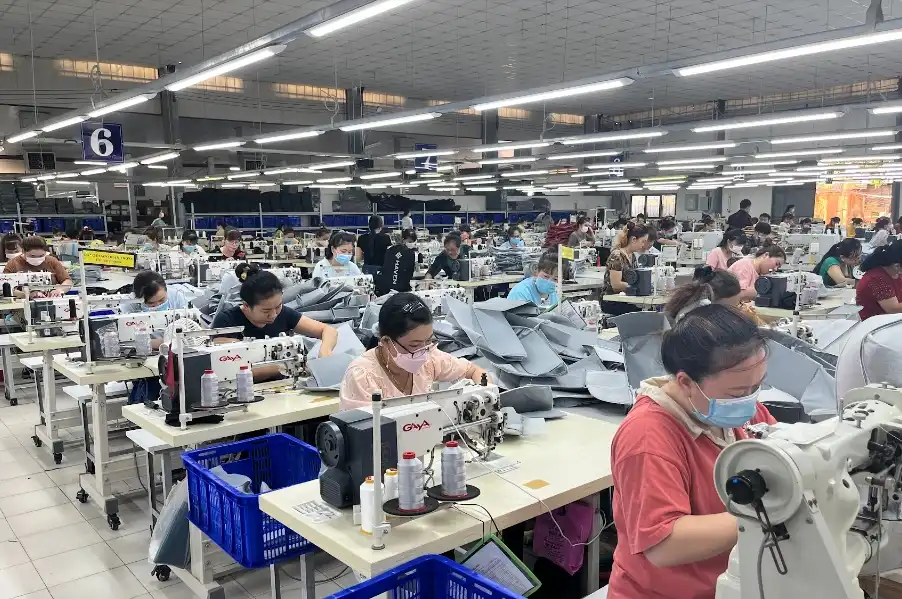Strategic sourcing has evolved from simply securing goods and services to a holistic approach that supports quality, sustainability, and ethical practices in supply chains. As businesses aim to stay competitive while addressing environmental, social, and governance (ESG) goals, strategic sourcing has become essential for building resilience and efficiency. This article explores 12 companies with exceptional strategic sourcing practices, highlighting how each brand uniquely drives supplier relationships, cost efficiencies, and innovation.

What is Strategic Sourcing?
Strategic sourcing is a proactive approach to procurement that involves analyzing and optimizing the sourcing process to meet an organization’s long-term goals. Unlike traditional sourcing, which focuses primarily on cost, strategic sourcing takes a broader view, considering factors like quality, supplier relationships, risk management, sustainability, and innovation. By aligning sourcing practices with business objectives, companies can enhance their competitive advantage, build resilient supply chains, and support broader social and environmental initiatives.
Strategic sourcing companies prioritize collaboration with suppliers, sustainability, and operational efficiency. In today’s global market, this approach helps businesses navigate complex challenges such as supply chain disruptions, changing regulations, and the increasing demand for corporate responsibility.
Benefits of Strategic Sourcing for Businesses
Implementing a strategic sourcing approach can offer significant advantages for companies across industries. Here are some key benefits:
- Cost Savings: Strategic sourcing helps reduce operational costs by negotiating better terms, reducing waste, and optimizing inventory.
- Supplier Collaboration: Long-term relationships with suppliers foster trust and innovation, allowing companies to co-create solutions and improve product quality.
- Risk Mitigation: Strategic sourcing enables better risk management by diversifying suppliers and implementing practices to address potential disruptions.
- Enhanced Sustainability: Many companies require suppliers to adhere to environmental standards, ensuring more eco-friendly and ethical sourcing.
- Increased Competitive Advantage: Companies that strategically source often have access to better materials, products, or services, helping them maintain a market edge.
As we explore the strategic sourcing practices of top companies, we’ll see these benefits in action.
Top 12 Examples of Strategic Sourcing
1. Amazon: Data-Driven Sourcing and Cost Efficiency
Amazon’s strategic sourcing practices set the bar high in retail. By leveraging advanced data analytics and performance metrics, Amazon identifies and fosters relationships with key suppliers that offer cost efficiencies and enhance customer experience. Amazon’s massive scale allows it to negotiate favorable terms with suppliers, ensuring competitive pricing across various products.
Amazon’s focus on technology extends to its inventory management systems, which allow for streamlined operations and reduced costs. This tech-driven approach supports Amazon’s commitment to providing customers with a wide selection of products at competitive prices. Additionally, Amazon collaborates closely with suppliers to foster innovation, focusing on cost reduction and improving operational efficiency to deliver a seamless shopping experience.
2. Toyota Motor Corporation: Just-in-Time and Supplier Relationships
Toyota has become an icon of strategic sourcing, largely thanks to its pioneering Just-in-Time (JIT) inventory management system. Central to Toyota’s operations, this approach minimizes waste by receiving goods only as needed. Toyota’s emphasis on strong, long-term relationships with suppliers is critical to the success of JIT, as it requires precise coordination and high reliability across the supply chain.
Quality and safety are core tenets of Toyota’s sourcing strategy. Toyota holds its suppliers to rigorous standards to ensure its products consistently meet these expectations. The brand’s focus on continuity and stability within its supply chain has cemented Toyota’s reputation for reliability and resilience, making it one of the world’s most respected automotive companies.
3. Apple Inc.: Innovation-Driven and Socially Responsible Sourcing
Apple’s strategic sourcing strategy reflects its commitment to high-quality products and ethical practices. Known for its iconic design and technology, Apple works closely with suppliers who can meet its high innovation, aesthetics, and functionality standards. Apple’s focus on collaboration with cutting-edge suppliers allows it to enhance its products' performance and design continually.
Social responsibility is integral to Apple’s sourcing practices. The company enforces a strict supplier code of conduct that requires fair labor practices, environmental sustainability, and safe working conditions. Apple also prioritizes supplier diversity, actively seeking partnerships with businesses owned by women, minorities, and veterans. This commitment to innovation and social responsibility has helped Apple maintain its position as a global leader in technology.
4. IKEA: Cost Efficiency and Sustainable Material Sourcing
IKEA’s approach to strategic sourcing is rooted in its mission to provide affordable, quality products. By forming long-term partnerships with suppliers, IKEA ensures it can keep costs low while maintaining high-quality standards. The company focuses on sustainable sourcing, especially for materials like wood, which plays a significant role in its products.
In addition to sustainable forestry practices, IKEA is committed to a circular economy approach, designing products and packaging that can be reused, repaired, or recycled. This sustainability focus extends throughout its supply chain, as IKEA collaborates with suppliers who align with its environmental goals. By emphasizing cost efficiency alongside sustainability, IKEA sets itself apart as a leader in responsible sourcing.
5. Microsoft: Supplier Diversity and Sustainability Commitment
Microsoft’s strategic sourcing emphasizes diversity and sustainability in its supplier relationships. The company promotes supplier diversity by partnering with businesses owned by underrepresented groups, strengthening both its supply chain and its commitment to social responsibility. Microsoft’s focus on reducing its environmental footprint extends to its suppliers, as it encourages them to adopt sustainable practices.
Through initiatives like renewable energy sourcing and waste reduction programs, Microsoft aims to minimize the environmental impact of its operations. Microsoft also enforces compliance with human rights and labor standards in its vendor relationships, ensuring that all partners meet ethical standards. By combining supplier diversity with sustainability efforts, Microsoft exemplifies a forward-thinking approach to sourcing.
6. Starbucks: Ethical Sourcing and Coffee Farmer Equity
Starbucks has long been recognized for its ethical sourcing practices, especially through its Coffee and Farmer Equity (C.A.F.E.) Practices program. This initiative helps Starbucks source coffee beans responsibly by supporting fair labor practices and sustainable farming. Starbucks promotes environmentally friendly farming techniques through partnerships with farmers, ensuring its supply chain meets ethical standards.
Transparency and quality are key elements of Starbucks’ sourcing approach. By working closely with coffee producers, Starbucks ensures that the coffee it serves meets strict quality standards while supporting the farmers' livelihoods. Starbucks’ commitment to ethical sourcing has made it a model for other companies seeking to balance business goals with social and environmental responsibility.
7. Nike: Eco-Friendly Materials and Fair Labor Practices
Nike’s strategic sourcing efforts prioritize sustainable materials and fair labor standards across its global supply chain. Nike is a leader in sustainable innovation, developing eco-friendly materials for its products and reducing its carbon footprint. Nike aims to create a more sustainable future by sourcing materials that minimize environmental impact.
Fair labor practices are another cornerstone of Nike’s sourcing strategy. The company enforces strict labor standards within its supply chain and regularly audits its suppliers to ensure compliance. Nike’s commitment to responsible sourcing helps maintain its reputation as a brand that values social and environmental stewardship.
8. Home Depot: Responsible Sourcing and Supplier Compliance
Home Depot takes a comprehensive approach to strategic sourcing, focusing on responsible sourcing and supplier compliance. The company maintains a robust supplier compliance program to ensure ethical practices throughout its supply chain. Home Depot’s commitment to quality materials and responsible practices is evident in its partnerships with suppliers who share these values.
Supplier diversity is another key aspect of Home Depot’s sourcing strategy. Home Depot supports many businesses by promoting inclusivity within its supply chain. The company also emphasizes environmental responsibility, working with suppliers who adopt sustainable practices to reduce their environmental footprint.
9. Coca-Cola Company: Supplier Diversity and Sustainable Ingredients
Coca-Cola’s strategic sourcing centers around long-term partnerships with suppliers who meet the company’s high standards for quality and sustainability. Coca-Cola’s supplier diversity initiatives ensure that it partners with businesses owned by underrepresented groups, promoting inclusivity within its supply chain.
The company prioritizes sustainable ingredient sourcing, seeking suppliers who share its commitment to reducing environmental impact. Coca-Cola’s goals include reducing water use, recycling materials, and lowering greenhouse gas emissions. Coca-Cola can achieve its ambitious environmental objectives by collaborating with suppliers on sustainability initiatives.
10. Walmart: Technology-Driven Sourcing and Supplier Efficiency
Walmart is known for its efficient sourcing practices, which are driven by advanced technology and analytics. By using data to optimize its supplier relationships, Walmart achieves significant cost savings and enhances supply chain efficiency. Walmart’s scale allows it to negotiate competitive terms, ensuring it can offer customers low prices across various products.
Walmart’s commitment to sustainability is also a key part of its sourcing strategy. The company collaborates with suppliers who prioritize eco-friendly practices, encouraging them to reduce their environmental impact. Walmart’s blend of technology-driven efficiency and sustainability initiatives has helped it become one of the world’s leading retailers.
11. Procter & Gamble (P&G): Innovation, Sustainability, and Collaboration
Procter & Gamble (P&G) integrates strategic sourcing into its business model to enhance innovation, sustainability, and quality. P&G works closely with suppliers to improve product quality and foster collaboration. The company also emphasizes sustainable sourcing, reducing its environmental footprint across its supply chain.
P&G’s commitment to social responsibility is evident in its partnerships with suppliers who adhere to ethical and environmental standards. The company also encourages suppliers to innovate and adopt sustainable practices, supporting P&G’s mission to deliver high-quality products to customers while promoting environmental stewardship.
12. Samsung Electronics: Sourcing for Technological Advancement and Ethical Standards
Samsung’s strategic sourcing focuses on securing high-quality materials and advanced technologies that drive product innovation. Samsung collaborates closely with suppliers to ensure they provide cutting-edge components that enhance the performance of its products. The company’s emphasis on innovation helps it maintain a competitive edge in the electronics industry.
Samsung is also committed to ethical sourcing practices, requiring its suppliers to meet strict standards for labor and environmental practices. Samsung’s supplier responsibility program includes regular audits to ensure compliance with ethical standards, reinforcing its commitment to social responsibility and quality.
How Strategic Sourcing Contributes to Sustainability and Social Responsibility
These companies show how strategic sourcing can support broader sustainability and social responsibility goals. Businesses can drive positive change beyond their operations by choosing suppliers committed to reducing environmental impact, improving labor conditions, and fostering diversity. For example, partnerships with ethical suppliers help reduce the carbon footprint and encourage fair labor practices globally. Furthermore, prioritizing diversity within the supply chain enables businesses to support communities and promote inclusivity.
Strategic sourcing benefits companies and their customers and contributes to a more sustainable and equitable world. By adopting these practices, businesses can address stakeholder demands for corporate responsibility and create lasting positive impacts.
Final Thoughts // Strategic Sourcing
The companies featured in this article demonstrate how strategic sourcing can drive business success and positive social and environmental impact. These brands set a high standard in sourcing and supply chain management by prioritizing sustainable practices, fostering long-term relationships, and leveraging technology. As businesses increasingly recognize the importance of ethical sourcing, strategic sourcing emerges as a key differentiator that supports quality, resilience, and responsibility.
These examples provide valuable insights for companies looking to strengthen their supply chains and align sourcing practices with broader business and social goals. Embracing strategic sourcing can transform a company’s operations and reinforce its commitment to customers, communities, and the planet.
Strategic sourcing isn’t just about obtaining products—it’s a powerful tool for building a resilient and sustainable future.




